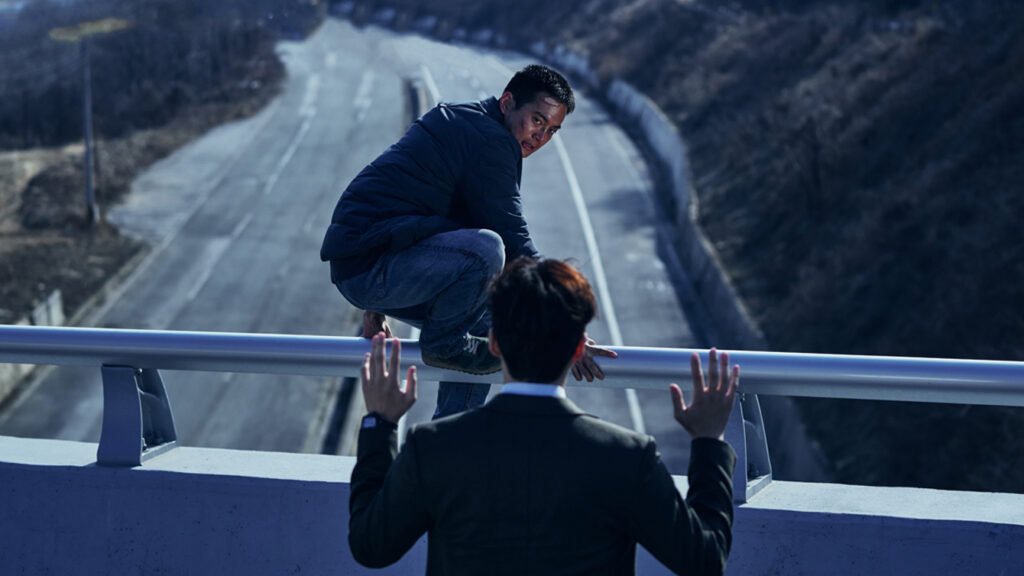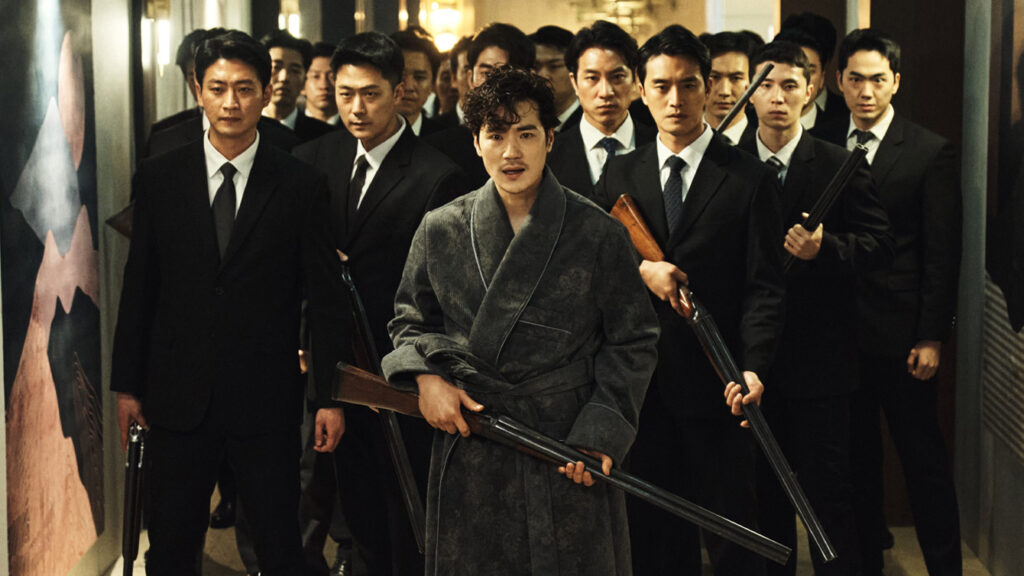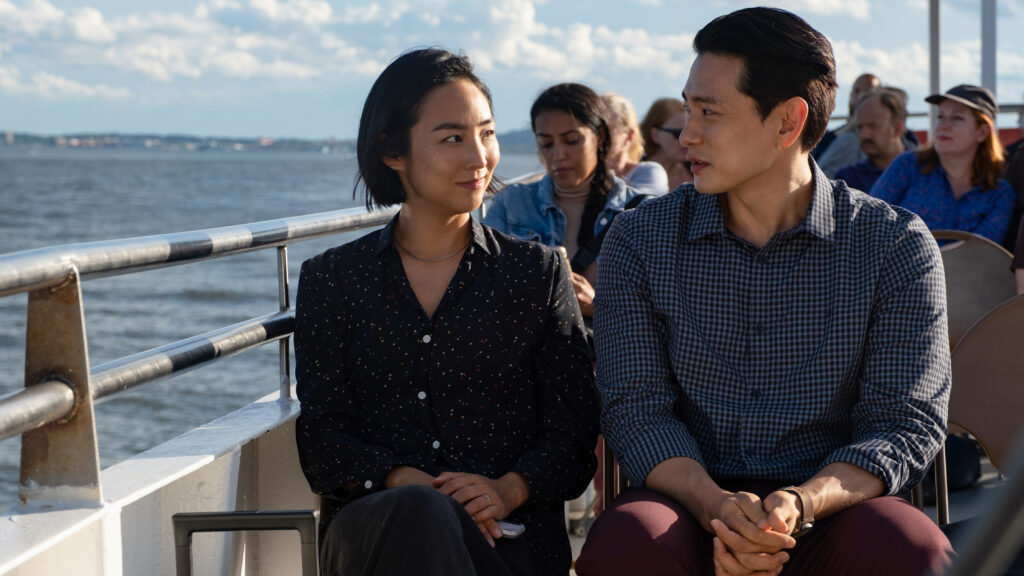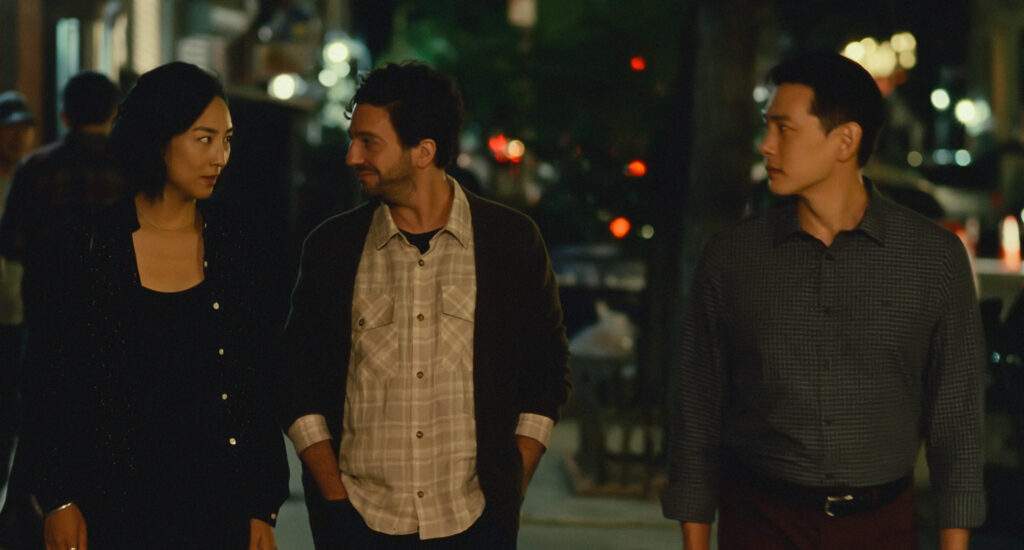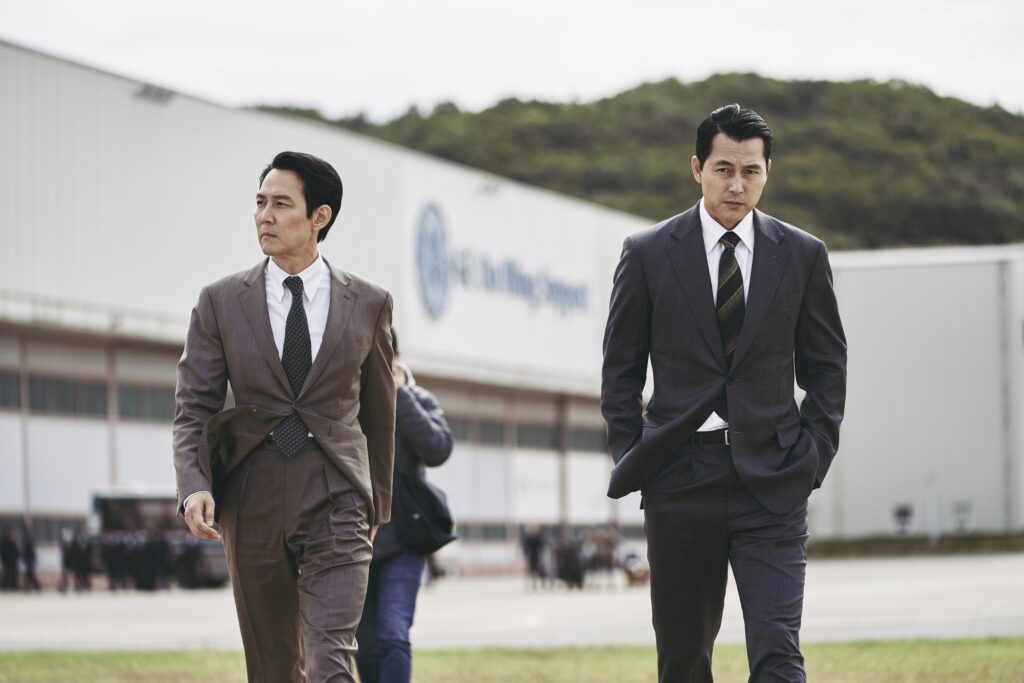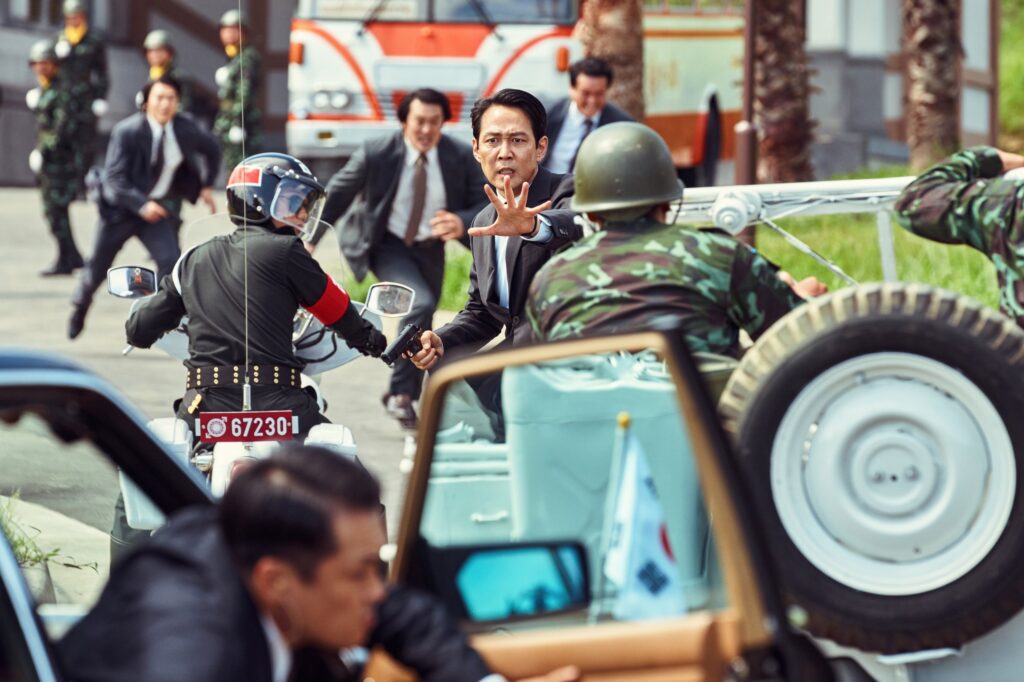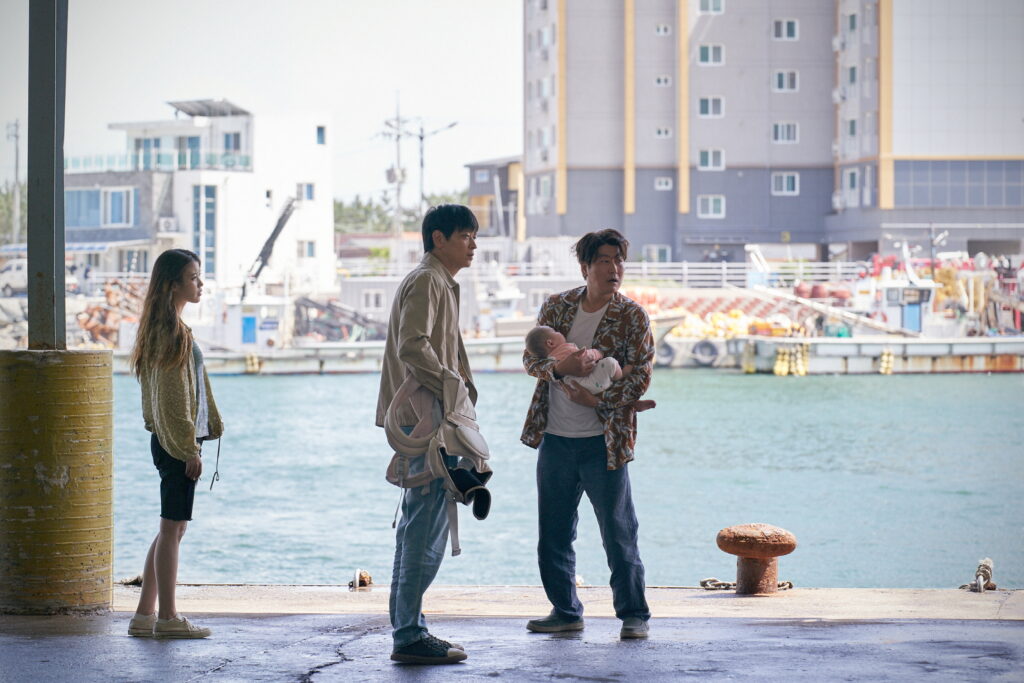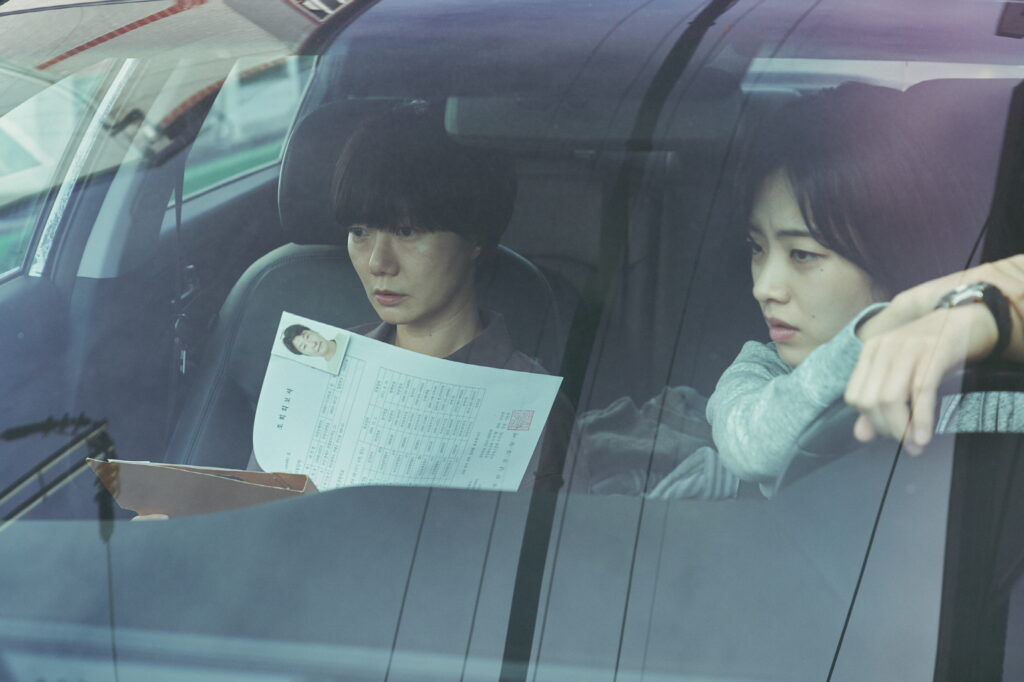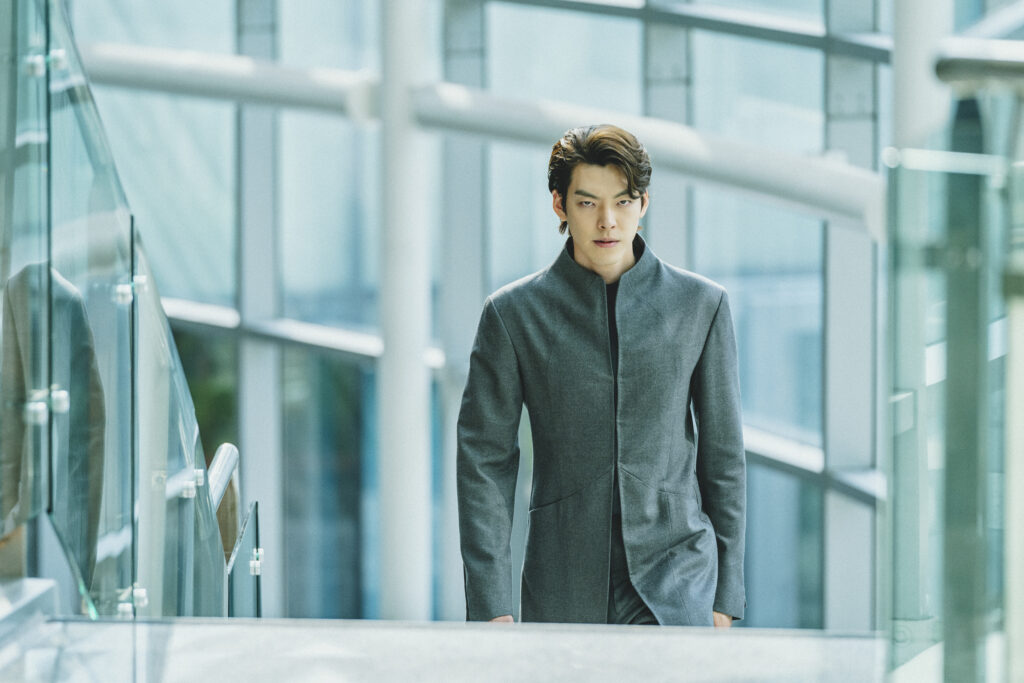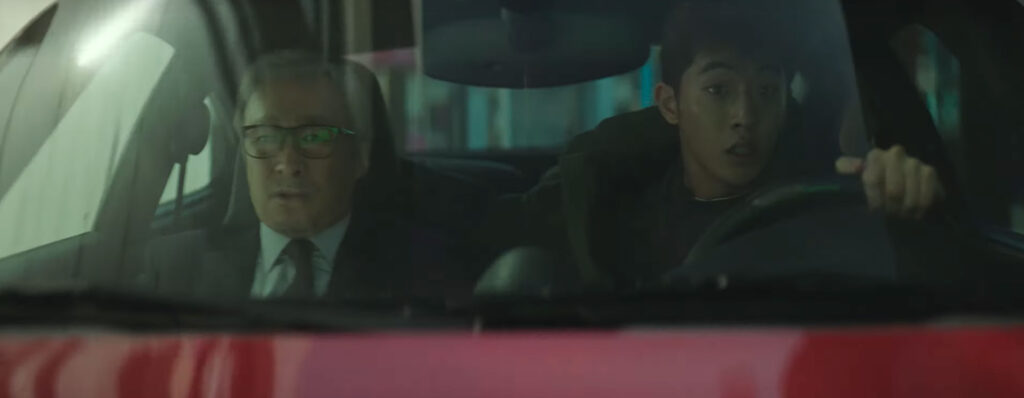August 8, 2023
by Carla Hay

Directed by Kim Seong-hun
Korean and Arabic with subtitles
Culture Representation: Taking place in 1986 and 1987, in Lebanon, South Korea, and Switzerland, the action film “Ransomed” features a predominantly Asian cast of characters (with some white people) representing the working-class, middle-class and wealthy.
Culture Clash: A South Korean diplomat, who is assigned to duties in the Middle East, goes to Lebanon to rescue a kidnapped colleague, and the diplomat teams up with a rebellious taxi driver, who’s a South Korean living in Lebanon, as they make an unlikely duo for the rescue mission.
Culture Audience: “Ransomed” will appeal primarily to people who are interested in watching thrilling action films that use the tried-and-true storyline of a seemingly mismatched duo learning to work together for a common goal.

“Ransomed” uses a familiar formula of a bickering duo forced to work together in stressful situations. However, this suspenseful political thriller transcends its clichés by having great action sequences and believable performances from the principal cast. “Ransomed” is set in the 1980s, and it’s filmed as a throwback homage to 1980s live-action films, by having action sequences done by real people, not generated by excessive computer imagery.
Directed by Kim Seong-hun, “Ransomed” takes place briefly in 1986 and mostly in 1987. An opening statement shown on screen says that the story is “based on true events,” but many parts are fiction. The “true events” part of the story is about the real-life 1986 kidnapping of Do Chae-sung, who was a second secretary of the Korean embassy and was abducted in Beirut, Lebanon. Kim Jung-Yeon and Yeo Jung-mi wrote the gripping screenplay for “Ransomed.”
The beginning of ransom takes place in Beirut, where thousands of people are dying in Christian/Muslim conflicts. Amid this turmoil, a South Korean diplomat named Oh Jae-seok (played by Kim Jong-soo), a married father who has been assigned to work in Lebanon, is kidnapped by gunpoint by a group of Lebanese terrorists. He’s thrown into the trunk of a beat-up Mercedes and goes missing for a year. During that time, many people assume that Jae-seok is dead.
Meanwhile, in 1987, at the Korean Ministry of Foreign Affairs, one of Jae-seok’s colleagues has grown frustrated in the job. Lee Min-jun (played by Ha Jung-woo), a Korean Ministry of Foreign Affairs director in his 40s, and has just been passed over for a promotion to be assigned to the South Korean embassy in London. The job instead went to a younger man, who is praised during a meeting as being an “heir apparent,” which implies that he got the job because of nepotism. Min-jun wanted to transfer to London instead of the war-torn Middle East, where Min-jun has been assigned to be diplomat.
Min-jun complains to his boss about someone with less experience getting the job opportunity that Min-jun wanted. Min-jun’s boss responds by saying that the other man got the job because he’s was a political science major at the University of Seoul. Min-jun mutters that he’s tired of these University of Seoul grads taking the jobs of more qualified people. Min-jun is so bitter about not getting the promotion, when he’s alone in the office, he sprays pesticide on a bouquet of congratulator flowers that his office rival has on this desk.
Min-Jun will soon have bigger things to deal with than jealousy over a younger colleague. It isn’t long before Min-jun gets a strange phone call at work. The person on the other end of the line is not speaking. Instead, whoever is calling Min-jun is tapping out a special code that only people who work for the Korean Ministry of Foreign Affairs are supposed to know. The coded message says that the person calling is identifying himself the long-lost Jae-Seok.
Min-jun faces skepticism from many people about this phone call. To get to the bottom of the mystery, the Korean Ministry of Foreign Affairs consults Richard Carter (played by Burn Gorman), a British expert on the Middle East and a private political investigator for hire. Richard is up for the challenge of finding Jae-seok, but only if Richard is paid well for this job.
As a compromise, Min-jun says that Richard will only get paid if he shows “proof of life” for Jae-seok. It takes a little while, but that proof finally comes from a photo taken of Jae-seok holding up a recent newspaper with the date of the newspaper clearly shown. Keep in mind, this is in 1987, when Photoshop and other image-altering computer technology did not exist.
Richard tells the Korean Ministry of Foreign Affairs that Jae-seok’s kidnappers are terrorists who want a fortune in cash, as ransom money to release Jae-seok. The terrorists insist that the money has to be paid by the South Korean government. Min-jun goes to Switzerland to enlist the help of a wealthy man named Hay Shaito (played by Marcin Dorociński) on arranging where the ransom drop-off
It doesn’t take long for Min-jun to go to Lebanon, where he encounters several obstacles during his time there. While in Lebanon, Min-jun soon meets a taxi driver named Kim Pan-su (played by Ju Ji-hoon), who is originally from South Korea. Pan-su is a Vietnam War veteran, who later admits he “went mad” after his time in this war. Pan-su is married to a Lebanese woman named Layla (played by Nisrine Adam), who is a stereotypical “worried wife at home” in this male-dominated action film.
Someone else who gets involved in this kidnapping rescue is a Lebanese intermediary named Karim (played by Fehd Benchemsi), who helps Min-jun convert the ransom money into Lebanese cash. Karim, who is accustomed to dealing with terrorists, also gives Min-jun advice on how to deal with these terrorist kidnappers and how to plan to bring Jae-seok safely back to South Korea.
Min-jun needs Pan-su to be his translator and to teach Min-jun how to adjust to being in Lebanon as someone who is originally from South Korea. To further entice Pan-su into helping, Min-jun tells Pan-su that Min-jun can arrange for Pan-su and his wife to get a U.S. visa.
These two unlikely partners have opposite personalities, Min-jun is very orderly and “by the book.” Pan-su is a freewheeling loose cannon. Min-jun doesn’t know if he can fully trust Pan-su. A series of events force them to work together to keep each other alive.
“Ransomed” has some aspects of the story that seem far-fetched by actually makes some sense, under the circumstances. Min-jun is essentially the only Korean Foreign Ministry of Affairs official who’s going to be the one dropping off the money. Why doesn’t Min-Jun have more backup from his colleagues?
It’s explained in the movie that the terrorists have spies who are checking to see if Min-jun is planning an ambush with his colleagues or law enforcement. Typically, in a kidnapping ransom dropoff, the kidnappers only want to see one person dropping off the money. An exception is made for Min-jin, who relays a message to the terrorists through Karim, that Min-jin needs Pan-su to be with him as a translator.
As is expected in this type of action flick, there are car chases and shootouts. However, these scenes are better-than-average because of the skillful cinematography and the way these scenes are filmed to put viewers right into the action. Hardly any of it looks fake, although there are a few moments that look somewhat far-fetched in a “dangling from a building” scene.
Aside from the action scenes, the believable chemistry (sometimes friendly, sometimes hostile) between Min-jin and Pan-su will be what viewers will remember the most about “Ransome.” The argumentative conversations between Min-jin and Pan-sue are often intentionally comedic. The performances of Ha and Ju are completely entertaining to watch.
The last half-hour of “Ransomed” takes a turn into something more meaningful than just a “heroes versus villains” story. “Ransomed” also gives a realistic look at how the trauma of captivity can really damage someone and what human compassion looks like in the midst of death and destruction. “Ransomed” won’t be considered a classic action movie, but this adrenaline-packed movie gets the job done well in all the right places.
Well Go USA released “Ransomed” in select U.S. cinemas on August 4, 2023. The movie was released in South Korea on August 2, 2023.

